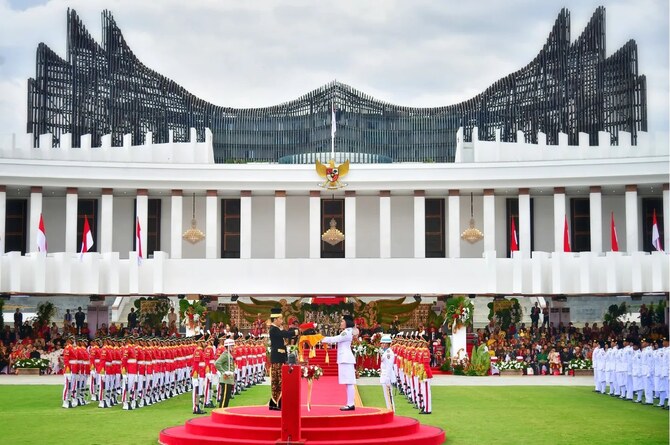JAKARTA: Indonesian President Joko Widodo led the country’s 79th Independence Day ceremony on Saturday. It was the first time the ceremony has been held in the country’s unfinished future capital of Nusantara, marking a milestone in the government’s ambitious plan to move the center of government from Jakarta to the new city emerging out of the Borneo jungle.
Widodo was accompanied by Defense Minister and President-elect Prabowo Subianto. A similar event was held simultaneously in the current capital, Jakarta, which was attended by Vice President Ma’ruf Amin and Vice President-elect Gibran Rakabuming Raka, Widodo’s eldest son.
Around 1,300 officials and invited guests wearing traditional attire from various Indonesian provinces attended the Nusantara gathering at the new State Palace.
“(Nusantara) marks the beginning of three big transitions for Indonesia: welcoming a new capital city, the change of leadership, and preparations for 2045 Golden Indonesia,” Widodo said in a statement in lieu of an Independence Day speech, referring to the plan to make Indonesia a developed nation by 2045, the centennial of its independence from the Netherlands.
“May our Independence Day celebrations this year remind us that the spirit of unity is what makes Indonesia stronger in its journey toward 2045 Golden Indonesia.”
Nusantara is being developed in East Kalimantan, a forested pocket on Borneo island, about 1,200 km away from Jakarta, which is located on Java island.
Widodo officially announced the relocation of the capital in 2019. The move is intended to ease Jakarta’s issues with chronic traffic congestion, overpopulation, and heavy pollution. Jakarta is also one of the world’s fastest-sinking cities.
Widodo said one of the aims of the $32 billion Nusantara megaproject is to redistribute wealth across Indonesia, as Java island is home to around 56 percent of the country’s population and nearly 60 percent of economic activity. But many see it as an attempt to seal his legacy before the end of his second and final term in October.
The relocation process is scheduled for completion by 2045, with Widodo envisioning Nusantara as an eco-friendly, smart “forest city,” powered by renewable energy.
Widodo has said that the change of the seat of government will require a presidential decree that can only be signed by his successor, Subianto, who has vowed to continue the project and who will be sworn in as Indonesia’s eighth president on Oct. 20.
Nusantara has suffered construction delays, and has failed to attract the hoped-for foreign investment. The project has also been criticized by environmentalists and indigenous communities, who have previously warned that the plans for the new capital were rushed through without consultation.
On Saturday, on the side of a new bridge located in the same district as Nusantara, activists held a peaceful demonstration and hung a banner reading: “Indonesia is Not For Sale. Freedom!”
“At the end of his term, (Widodo) is leaving behind a legacy of injustice. The Nusantara capital that he is so proud of is a haphazard and reckless project that violates the rights of indigenous and local communities, but provides a red carpet for oligarchs,” Arie Rompas, head of campaigns at Greenpeace Indonesia, said in a statement.
Earlier this month, the government launched new capital incentives, including land rights of up to 190 years, in an attempt to attract new investment, as the government hopes to cover only 20 percent of the project’s hefty budget, so is relying heavily on private-sector support to build key infrastructure and public facilities.
Fathur Roziqin Fen, director of the Indonesian Forum for the Environment’s chapter in East Kalimantan, said there are “silent victims” of the Nusantara project, including endangered species such as orangutans and long-nosed monkeys, whose “habitat and existence are threatened” because of the development.
Meike Inda Erlina, Trend Asia program campaigner, called Nusantara a “business project” that is likely benefiting only a small number of the political elite.
“Behind the magnificent story conveyed to the international community about the development of the nation’s capital city, (Widodo) is leaving an economic burden and a burden of ecological damage for the people,” she said.
















